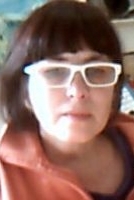
UnTwelve: Let's start with a question I've asked some of the others...tell us what got you interested in alternative tunings and microtonality.
OY: As a flutist (amateur, though I have a diploma from Music School of Conservatory in Moscow at age 15), I was interested in extended flute techniques, which includes micro-tones and multiphoniques, which are present in music of, for example, Jan Clarke. I like the singing of birds, those are also microtonal, as many ethnic scales are. Also, I was writing a computer-assisted musical composition program to explore mathematical algorithms in music composition and all the possibilities and definitions of music (classical), to add also to my repertoire of (flute) music and being able to play with laptop accompaniment, as my pianist died from cancer.
UnTwelve: Was there any particular angle you felt you composition for the competition was exploring?
OY: Actually, most of my music came from testing that computer application, which began a few months ago. To declare it finished I had to win in a couple of competitions. The idea of permutations, which is used in the composition, came probably from having thought about using my application also as music therapy later. (For others, because I myself am not music therapist.)
UnTwelve: Can you say more about the type of computer interaction and software design you are engaging in?
OY: I began writing it a few years ago, when the concept was still new. In last years there appears to be development in this area, PHDs in Artificial music intelligence etc. The software includes convenient graphic user interface, combinatorial methods, some probabilistic and Markov-chains based algorithms for music generation, some of them based on my analysis of existing music. (I had a preference to analyzing French composers and Bach, in fact - only those, who wrote a flute music I like to play.) Music from images, texts. It includes automatic instrumentation, harmonization , and many other tools. It includes also such tools as tuning, metronom, Flutist from Hamelin (high-frequencies generated music which is supposed to make life of small living beings miserable, useful in many places on our Earth, such as here), pitch-detection (one voice ), search/replace like in Word processing software, only with pitches instead of letters. It can be used as encryption software or as musical filters, the first becoming redundant with development of quantum computers.
UnTwelve: Any composers past or present that stand out as sources of inspiration for you?
OY: French and Italian, such as Debussy, Jolivet, Maderna, Berio, Boulez, Japanese - such as Takemitsu. Sure, I forget many others.
UnTwelve: What's next for you, composition-wise? And, how do you plan on using your 3rd prize money?
OY: I still do not have music for me to play, except one-two short pieces. Also, to complete the application, I need to write many other forms including a symphony (which technically means - making a button which generates symphony of specific duration, possibly using some given melodies), all that is forms/laws/etc. My own musical ideas just became possible as I have this necessary interface, but it is the peak of heat here [in Israel], the Hebrew month of "Tammuz", as is called my last composition. I really did not plan yet what to do with the prize money - may be to buy a swimwear.